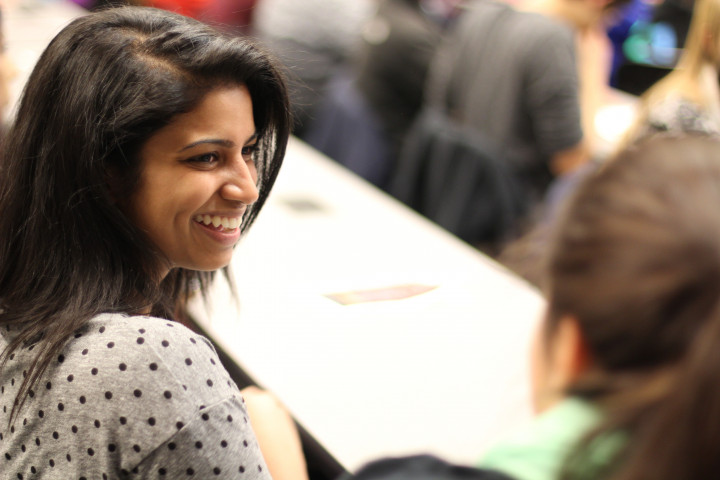How the Iribe Initiative’s Alumni Mentoring Program Prepares Undergraduates for the Professional World
Mentorship goes both ways—that’s what Yue “Monica” Zhu (B.S. ’15, computer science) learned from her experiences mentoring a student at her alma mater through the University of Maryland’s Iribe Initiative for Inclusion and Diversity in Computer Science (I4C).
“Talking with students gives us mentors a fresh perspective,” Zhu said. “Students ignite our minds on, ‘Wow, that was why I fell in love and chose this career path in the first place.’ The students I’ve worked with through the I4C mentoring program are driven, curious and eager to get their careers in tech started.”
Since graduating in 2015, Zhu has been a software engineer at Capital One, where she develops the user experience for the authenticated page customers see when they log into their accounts. Even with her full-time job, volunteering as a mentor continues to be a critical part of Zhu’s professional development. She discovered that mentoring students motivates her to maintain and broaden her own coding skill sets.
In I4C’s Peer and Alumni Mentoring Program, alumni sign up by September or February and are paired with students for the semester that follows based on both of their preferences—from experience and identity to career aspirations. Mentors commit at least three hours per month to meet with mentees one-on-one either virtually or in person. During the 2020-2021 academic year, 65 students and 30 alumni participated in the program, joining monthly professional development group meetings on topics including academic success, networking and imposter syndrome. Each meeting is followed by a hands-on technical workshop.
During the fall 2020 and spring 2021 semesters, Zhu mentored Mohammed Kabir, a rising junior computer science major. When they met via Zoom, she offered tips and tricks for navigating the school-to-work adjustment after graduation. She also shared tools like Github and technical concepts like Agile methodology, a type of project management process used for software development. For Zhu, Kabir’s intellectual curiosity and hardworking nature made the mentoring experience fun and rewarding.
“Mohammed has been juggling his schoolwork, side projects and the materials I have given him to read and understand,” Zhu said. “He did not hesitate to ask questions when I presented new concepts and tools. Mohammed is always on top of his grades—not to mention he’s interning at Amazon this summer.”
Zhu knows firsthand the value of securing internships and building professional relationships as a student. During her sophomore and junior years, Zhu interned at PayPal, where her manager mentored her and encouraged her pursuit of a career in computer science. That experience inspired Zhu to pay it forward by becoming a mentor herself.
Though she might not have known it at the time, Zhu was just the kind of mentor Kabir was looking for—someone who could walk him through her professional and academic experiences to help him find his own path. Entering his sophomore year in fall 2020, Kabir wanted to learn about study techniques, ways to get involved on campus and best practices for applying for internships.
“For getting internships, I realized there was a lot I did not know,” Kabir said. “I really lucked out in getting paired up with Monica. Personally, her mentorship helped me gain more confidence about the path I am taking and more knowledge about what to expect. Professionally, her mentorship helped me land an internship at Amazon, which has been a huge step for me.”
While Kabir interns at Amazon this summer, Zhu volunteered to be a mentor with I4C’s first Break Through Tech Summer Guild. During the weeklong program, she will teach incoming freshmen and rising sophomores about coding and user experience and help them create tech solutions to transportation challenges in the city of College Park.
And Zhu plans to continue mentoring moving forward. She will pair up with a new student this fall and plans to mentor at campus hackathons Technica and Bitcamp. Drawing on her own experience, she’s committed to making a difference for other aspiring computer scientists.
“I definitely plan to mentor more computer science students at Maryland in the future,” Zhu said. “I am hoping this mentorship will help students prepare for future work environments, whether it is an internship or full time. I personally wish I had known what I know now back when I was in undergrad, which is why I love sharing my experiences in the hopes that these students can use them as a reference point and find their own successes along the way.”
Join Monica Zhu in this fall’s cohort of mentors! If you’re interested in sharing your experiences and expertise with a current computer science student, complete this interest form for the Fall 2021 I4C Peer and Alumni Mentoring Program. This fall’s mentoring session will be a hybrid format, with opportunities to engage virtually and in person.
What to Expect:
- Engage in one-on-one mentor/mentee relationships
- Commit a minimum of three hours with your mentee each month for the duration of one semester (three months)
- Select your matching preferences based on computing interests and experience
- Mentor up to three students per semester
I4C will host a virtual information session for mentors on Friday, August 20, 2021, from 12:30 to 1:30 p.m. ET. Learn more about the program by attending this session on Zoom, and contact Veronica Sanchez at vsanche8 [-at-] umd [dot] edu () with any additional questions about the program.
Written by Katie Bemb
The Department welcomes comments, suggestions and corrections. Send email to editor [-at-] cs [dot] umd [dot] edu.
